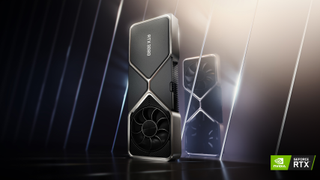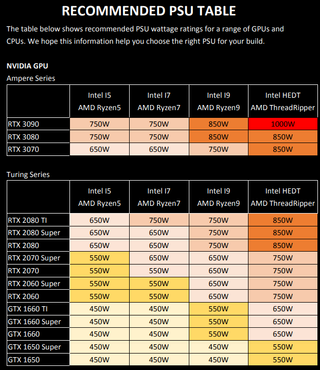Nvidia's RTX 3000 Power Supply Requirements Amp Up PSU Shortage Concerns
The RTX 3080 sucks a lotta juice, right during a PSU shortage

Since the Nvidia Ampere Keynote, we've known the RTX 3080 and RTX 3090 are going to be absolute power suckers, Nvidia itself recommends a bare minimum of a 750W power supply for the RTX 3080 and RTX 3090, but you'll need larger power supplies for some systems. Our testing backs that up, too; we observed up to a 335W average power draw from just the 3080. This means many of us will need new power supplies, unfortunately right during a PSU shortage that has sent pricing skyward on some models (more on that shortly).
However, current platform-level power supply recommendations for Ampere systems are somewhat vague, with CPUs these days varying in power consumption significantly. Asus is attempting to rectify the issue with a chart explaining what PSU wattage requirements you really need for your specific Ampere GPU + CPU platform. (It also included a PSU table for Turing.)

Power Supply Requirements for Nvidia GeForce RTX 3090
For the Nvidia GeForce RTX 3090 PSU requirements, you'll want a 750W power supply if you pair the card with a mainstream Core i5/i7 processor or Ryzen 5/7 CPU. That requirement jumps to 850W for Intel Core i9 and Ryzen i9 chips, with a peak of 1000W for Intel HEDT and AMD Threadripper platforms.
Power Supply Requirements for Nvidia GeForce RTX 3080
Mainstream Core i5/i7 and Ryzen i5/i7 system PSU requirements stay the same at 750W for the Nvidia GeForce RTX 3080 as they are for the RTX 3090. However, you only need an 850W power supply for HEDT/Threadripper and Core i9/Ryzen 9 platforms.
Power Supply Requirements for Nvidia GeForce RTX 3070
Finally, for the Nvidia GeForce RTX 3070 PSU requirements, you'll "only" need 650W for Core i5/i7 & Ryzen 5/7 systems, 750W for Core i9/Ryzen 9 systems, and 850W for HEDT/Threadripper platforms.
Power Supply Shortage 2020 - Causes and Impact
Ampere's increased power consumption requirements is going to be a shock for system builders – up until now, Nvidia has tended to keep power the same but push the performance envelope as high as possible (cards like the GTX 750 Ti and GTX 1070 are good examples). But Nvidia's unorthodox strategy with Ampere puts performance over power consumption, which will push a lot of PC builders toward upgrading their PSU.
If only it were that easy. Unfortunately, due to the pandemic, power supply volume has been at an all-time low, causing stock outages and prices to rise on some models. We touched upon the topic a month ago, and the cause of the PSU shortage is a multi-pronged issue:
Stay on the Cutting Edge
Join the experts who read Tom's Hardware for the inside track on enthusiast PC tech news — and have for over 25 years. We'll send breaking news and in-depth reviews of CPUs, GPUs, AI, maker hardware and more straight to your inbox.
- The desktop PC market grew faster than expected due to everyone working from home
- The pandemic paralyzed China's production for a few months
- Shipping products via plane became three times more expensive due to the pandemic
Looking at 750W power supply listings on Newegg.com, it appears that stock for PSUs is okay today, but prices are still over-inflated on most units. So if you're one of those unlucky people that don't have a qualifying unit to compliment your RTX 3080, be prepared to pay even more for your RTX 3080 upgrade than what you see on the GPUs sticker.
Supply chain issues can take months to resolve, and we may not be in the worst of the power supply shortage yet. Given the current state of the market and the expected rush of new PSU orders as enthusiasts build out new Ampere systems, it's possible we could see the supply situation worsen, or pricing increase further. We'll update as necessary.

Aaron Klotz is a freelance writer for Tom’s Hardware US, covering news topics related to computer hardware such as CPUs, and graphics cards.
-
Erezeneb I'm replacing SLI r9-380s at near 200w each.Reply
Ryzen 5
And I'm on a 550w..
Case isn't stuffed full of RGB and spinning rust, so it'll be fine. -
sizzling Are you suggesting in this article that NVidia’s recommendation is wrong? The NVidia 750w recommendation for 3080/3090 and 650w for 3070 is already based on running an i9 10900k. NVidia actually stateReply
“2 - Recommendation is made based on PC configured with an Intel Core i9-10900K processor. A lower power rating may work depending on system configuration.“
If you view the full spec here https://www.nvidia.com/en-gb/geforce/graphics-cards/30-series/ -
Olle P Reply
While not necessarily "wrong" it's definitely very cautious.sizzling said:Are you suggesting in this article that NVidia’s recommendation is wrong? ... based on running an i9 10900k. ...
With stock settings the tester at Sweclockers measured that the entire system pulled 415W from the wall socket at full load (running Metro Exodus). Shouldn't amount to more than 450W when really pushing it and then a little more peak.
Thus a 550W power supply of modern design should have no problem handling the load!
EDIT: (addition) Hardware Unboxed measured ~600W from the wall in a similar situation, so 750W or so could be a minimum that should fit all.
Overclocking will of course increase the power draw a bit, say an additional 100W.
The recommended 850W apply if a) the computer is essentially running at full load all the time while on, or b) the PSU is an older design that can't deliver (near) its full combined rating on the 12V line alone. -
JamesSneed The PSU recommendations are on the high end especially if you have a high quality PSU. However with that said I would follow them as they likely nail the efficiency curve of PSU's pretty well.Reply -
King_V They do have to be cautious, both in not knowing what CPU and other components may be in your system, and in not knowing whether the user is getting a high quality unit, something mediocre, or something on the questionable side.Reply -
w_o_t_q Only problem with PSU is that delivery is longer. I live in Europe and delivery from main Polish suppliers is not 3 days but 10 due to the border crossing time increase. The price again the same, recently bought a nice 750w 14 cm vent PSU for just 33 EUR around 35-37 USD. Ok it not modular, but it will cower most use cases. Buy as spare part for backup ... Problems have only American brands which was stupid enough to outsource productions to f** china companies ... and then after general warning about the unsafe enviroment there not move it Vjetnam/Indonesia ...Reply -
2Be_or_Not2Be SFX PSUs have been hard to get for a while now, and the Corsair SF750 extremely so.Reply
I'm continuing to roll with my SF600 and my low-power 3700X. If I actually could have gotten a 3080, I would have kept the SF600 with it. Total load should be ~500-550W, definitely something the SF600 can handle.
Now, if I had an overclocked Intel CPU, I probably would be looking for some way to shoehorn an ATX PSU into my mini-ITX case. No way I would be able to get a SF750 now! -
Soaptrail Reply
What if I have a Seasonic Titanium. I got a 650 watt. Now i have no plans for either a 3080 nor 3070 but with a Ryzen 3700 i wonder if I could power a 3080 for games and no overclocking.JamesSneed said:The PSU recommendations are on the high end especially if you have a high quality PSU. However with that said I would follow them as they likely nail the efficiency curve of PSU's pretty well.
Are these recommendations for non efficient PSU's or a specific efficiency, e.g. bronze? -
nofanneeded Reply2Be_or_Not2Be said:SFX PSUs have been hard to get for a while now, and the Corsair SF750 extremely so.
I'm continuing to roll with my SF600 and my low-power 3700X. If I actually could have gotten a 3080, I would have kept the SF600 with it. Total load should be ~500-550W, definitely something the SF600 can handle.
Now, if I had an overclocked Intel CPU, I probably would be looking for some way to shoehorn an ATX PSU into my mini-ITX case. No way I would be able to get a SF750 now!
I remember Silverstone made 800 watts SFX , cooler master made 850 watts SFX as well.
Edit :
https://www.coolermaster.com/au/en-au/catalog/power-supplies/v-series/v850-sfx-gold/
Edit :
https://www.silverstonetek.com/product.php?pid=731&area=en
Most Popular

